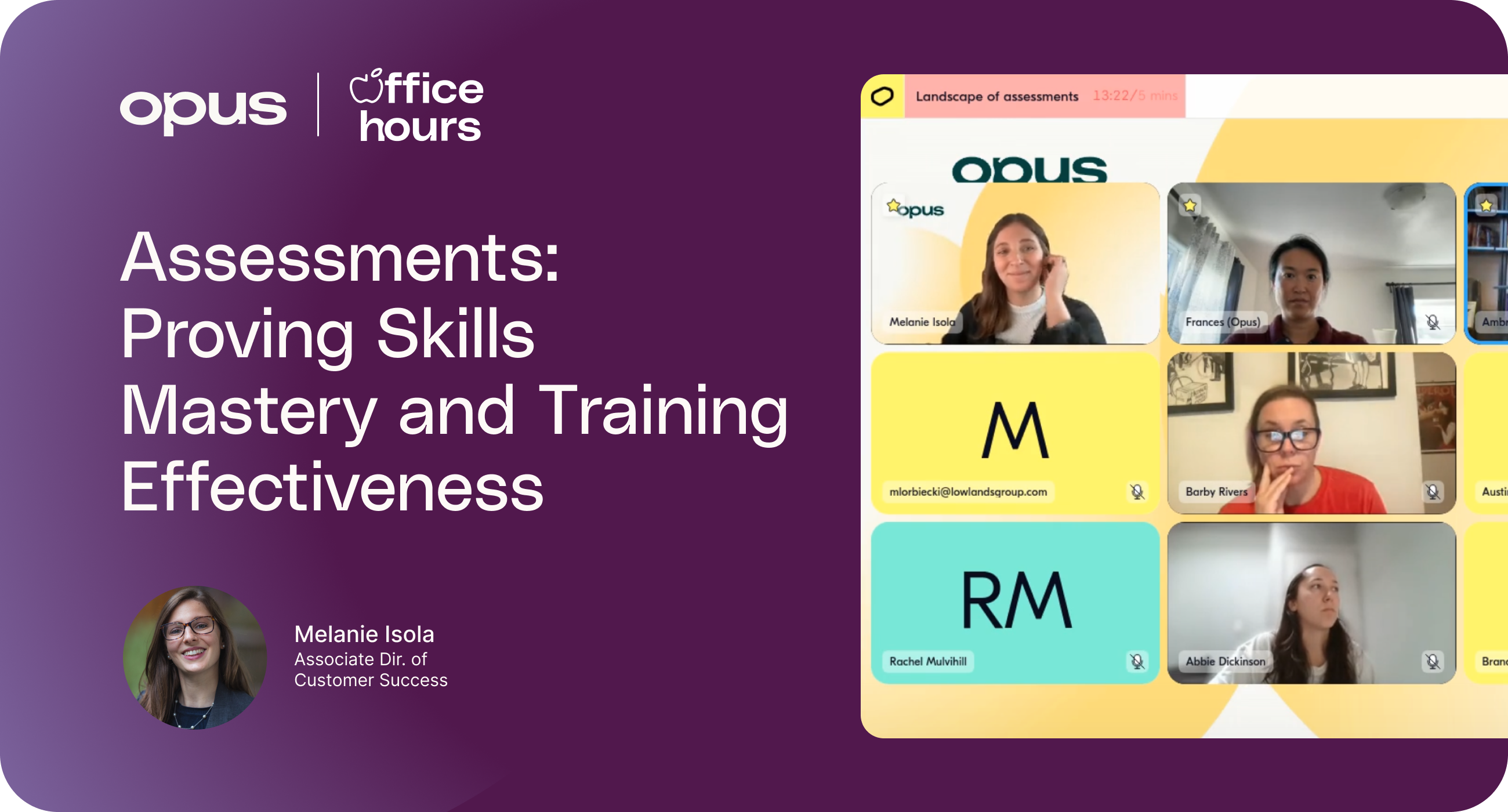While online courses and self-paced learning offer tremendous benefits, incorporating coaching into digital learning can take our educational experiences to new heights. The skill gap is real. Especially in the United States. And as companies are attempting to and looking to hire millions of people, they are having trouble finding talent with the right skills. They can do that by enhancing the training experience with online training platforms. But when you are employing people who don't sit at a desk all day, not every learning experience can nor should be digitized. That's where coaching comes in. This isn't just about completion anymore. Skills are about capabilities. But let's dive in.

Individual support is increased through coaching
While digital learning platforms provide access to vast amounts of information, they often lack personalized guidance and individual support. Coaching bridges this gap by offering one-on-one interactions, tailored feedback, and customized learning plans. By understanding learners' unique needs, aspirations, and challenges, coaches can provide targeted support and help individuals navigate their learning journey more effectively.
How coaching develops manager accountability (and motivation)
Online learning can sometimes be a solitary experience, lacking the external accountability that traditional classroom settings provide. Coaching introduces a sense of accountability and motivation by setting clear goals, tracking progress, and offering continuous support. Coaches keep learners motivated, provide timely feedback, and hold them accountable for their commitments, ensuring consistent progress and achievement.
Coaching gives real-world context to training
While digital learning platforms deliver theoretical knowledge, coaching helps bridge the gap between theory and practice. Coaches guide learners in applying what they've learned to real-world scenarios, providing insights, and helping them navigate challenges. By offering practical advice, real-time feedback, and facilitating critical thinking, coaching enhances the application of knowledge and accelerates skill development.
Coaching develops Soft Skills and Emotional Intelligence
Digital learning platforms often focus on technical and hard skills, but soft skills and emotional intelligence are equally crucial for success in the modern workplace. Coaching brings attention to these vital aspects by addressing communication, leadership, teamwork, and emotional well-being. Coaches provide guidance in developing empathy, resilience, and self-awareness, creating well-rounded professionals ready to excel in any environment.
Customized learning through coaching
Each learner is unique, with varying backgrounds, preferences, and learning styles. Coaching allows for customized learning journeys that adapt to individual needs. Coaches can identify learners' strengths and areas for improvement, tailor content and resources, and provide personalized recommendations. This level of customization ensures that learners get the most relevant and impactful learning experience.
By integrating coaching into digital learning platforms, we can unlock the full potential of online education. Learners will benefit from personalized support, accountability, and the application of knowledge in real-world contexts. By reimagining digital learning as a holistic experience that combines the power of technology with the guidance of coaches, learners are inspired to thrive in the digital age. At the same time, the hidden costs of training can be tracked once and for all.

Why Learning Management Systems (LMS) Don't have Coaching
I've been thinking about the lack of a coaching component in legacy learning platforms. (Legacy in the tech space IMO = more than 8 years). Conducting a technology audit of their businesses, many organizations are finding that their training is only touching 25% of their workforce. Learning Management Systems (LMS) revolutionized the way we deliver and consume online education. But, they lack a dedicated coaching component which can increase adoption and engagement. Here's why...
LMS is focused on content delivery - there are tech limitations
LMS platforms primarily focus on content delivery, tracking progress, and managing admin tasks. Incorporating a coaching component involves more sophisticated features, such as one-on-one interactions, personalized feedback, and even dynamic learning plans. That may pose architectural challenges for legacy software providers.
LMS focused on traditional education models
LMS platforms were initially designed to replicate traditional classroom environments, where learning is primarily self-paced and instructor-led. Coaching, on the other hand, emphasizes individual support. That deviates from the one-to-many model architected by legacy systems. The shift from a standardized approach to a more tailored coaching experience means rethinking traditional models.
LMS are already too resource intensive
Coaching involves human interaction, which is be resource-intensive and time-consuming. Integrating coaching into training platforms requires additional resources: qualified coaches, trainers, ongoing support. It's another level of certification that orgs are already doing in performance reviews but which has not been captured by legacy learning platforms.
LMS have integration challenges with coaching
Many organizations already have separate/external coaching programs. Integrating these initiatives into a legacy LMS can be complex, especially when considering user experience and compatibility with existing coaching frameworks. Overcoming these integration challenges requires a lot of work between coaching providers and LMS.
Despite the current limitations of Learning Management Systems (LMS), there is a growing recognition of the value that coaching brings to the online learning landscape. As the demand for personalized and adaptive learning experiences continues to rise, we can expect learning platforms to evolve and incorporate coaching components to enhance the learning journey.

How Opus seamlessly incorporates coaching into the learning experience
On-the-job training (OJT) is a vital component of employee development and skill acquisition within organizations. While structured training programs and resources are valuable, coaching plays a crucial role in maximizing the effectiveness and impact of on-the-job training. Here are a few reasons why coaching is essential in the context of on-the-job training.
Skill verification in on-the-job training (OJT)
This is process of assessing and validating an employee's competency and proficiency in specific job-related skills and tasks. It involves evaluating the employee's ability to perform assigned duties effectively and consistently, ensuring that they have acquired the necessary skills to perform their job responsibilities. Skill verification typically takes place after the initial training module or at specific milestones throughout the OJT program. It involves various methods to assess the employee's skills, such as:
Performance observations help with skill gaps
Supervisors or trainers observe the employee while they perform their job tasks. They assess the employee's competence in executing the required skills, ensuring that they follow proper procedures, adhere to safety guidelines, and produce the desired outcomes. This direct observation allows for real-time feedback and correction if necessary.
Demonstrations support non-guest facing employees
Employees may be asked to demonstrate their skills or perform specific tasks to showcase their proficiency. This can involve simulating real work scenarios or handling actual job responsibilities under supervision. Demonstrations provide an opportunity for employees to showcase their abilities and validate their skill acquisition.
Skills assessments support managers in their soft skills development
These assessments can take the form of written tests, quizzes, or practical assessments. They aim to evaluate the employee's understanding of theoretical concepts, knowledge of best practices, and ability to apply skills in different situations. Skills assessments provide a standardized way to gauge competency and ensure consistent evaluation across employees.
Self-Assessment leads to self-reflection
Employees may be encouraged to reflect on their own performance and assess their skills through self-evaluation. This allows them to identify areas of strength and areas that require further development. Self-assessment promotes self-awareness and ownership of skill development, empowering employees to take an active role in their training and growth.
The results of skill verification help identify any gaps in the employee's proficiency and guide further training or support. It allows organizations to ensure that employees are adequately trained and capable of performing their job tasks to the required standards. Skill verification is a crucial step in validating the effectiveness of the OJT program and ensuring that employees are equipped with the necessary skills to excel in their roles.




.png)


